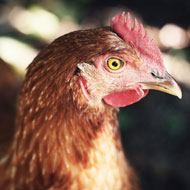
New measures introduced to prevent avian flu spread
Defra has temporarily suspended gatherings of some bird species across England, Scotland and Wales following the recent case of avian flu strain H5N8 at a Lincolnshire farm.
The ban has been introduced from today (20 Dec) to reduce the risk of the virus spreading. It applies to birds that are at higher risk of avian influenza, such as turkeys, chickens, ducks and geese, and restricts events such as livestock fairs, auctions and bird shows.
Pigeons and aviary birds are not included in the ban as they are at much lower risk of passing the disease to domestic poultry. Defra says this will be kept under review and may be lifted or amended as the risk level changes.
Avian influenza of the H5N8 strain was confirmed in turkeys at a farm near Louth in Lincolnshire last week (16 December). Defra has confirmed that all 2,500 birds at the farm have been destroyed and the farm disinfected. No further cases have been reported but restrictions around the site remain in place.
A prevention zone was introduced in England, Scotland and Wales on 6 December, requiring all poultry and captive birds to be housed or otherwise prevented from having contact with wild birds. This restriction remains in place.
Chief veterinary officer Nigel Gibbens said: "While we have seen no further cases of bird flu following the outbreak in Lincolnshire, we must continue to be vigilant and do all we can to protect against this highly pathogenic strain of the disease.
"This ban on gatherings is a proportionate step that will help protect our farmers and bird keepers from seeing their flocks infected with this disease that can have a devastating impact on poultry.
"The risk to human health continues to be very low and there is no impact on the food chain, but infection at a gathering could lead to rapid dispersal of infection to kept birds in many locations."
Bird keepers must report suspected cases immediately and maintain high biosecurity standards. For further information visit: www.gov.uk



 The Veterinary Medicines Directorate (VMD) is inviting applications from veterinary students to attend a one-week extramural studies (EMS) placement in July 2026.
The Veterinary Medicines Directorate (VMD) is inviting applications from veterinary students to attend a one-week extramural studies (EMS) placement in July 2026.